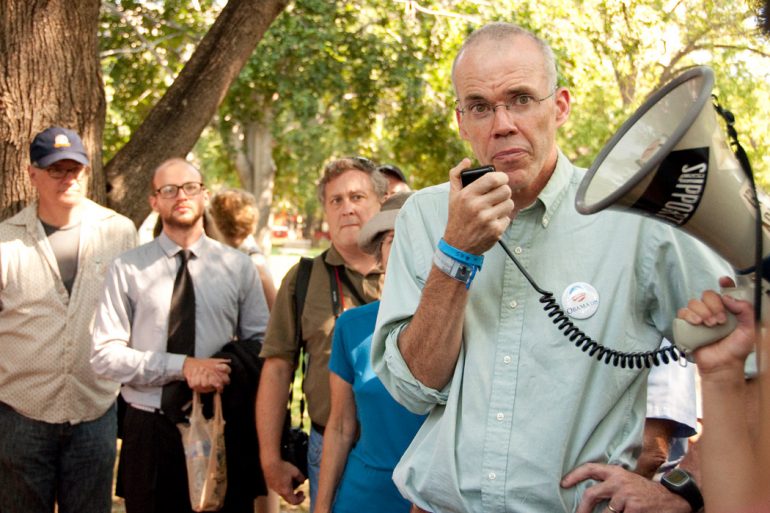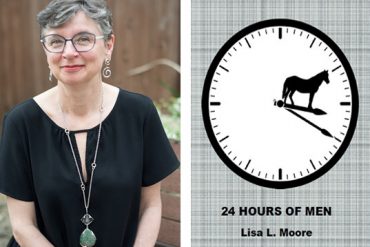Interviewing someone who has influenced and shaped your own writing is daunting, especially when that someone is Bill McKibben.
McKibben, who now spends much of his time traveling, speaking, and organizing his campaign, 350.org, is a tireless advocate for raising awareness about climate change. Credited with writing the first book for nonspecialists that spoke in depth about climate change, The End of Nature, McKibben has written a dozen books; his most recent book is Oil and Honey, which documents his apprenticeship to a local apiarist and the increased seriousness in the change of climate conditions.
Recently, I interviewed McKibben for The EcoTheo Review, asking how Christianity can be a catalyst for change and inspiration in the global climate change movement.
Bill McKibben has been recognized by numerous organizations and foundations for his endless work, including receiving a dozen honorary degrees. McKibben is a frequent contributor to various magazines including The New York Times, The Atlantic Monthly, Harper’s, Orion Magazine, Mother Jones, The New York Review of Books, Granta, Rolling Stone, and Outside.
McKibben has been more to me than just a helpmate by informing my thinking about climate change, he has led by example, raising awareness in the my mind about the importance of civil disobedience, the need for thoughtful writing, and the never-ending resolve to advocate that action and discussion about the need to address climate change.
In The End of Nature McKibben says, “There is a tendency at every important but difficult crossroad to pretend that it’s not really there.” It seems that this has been the common thinking in mainstream America and mainstream Christianity. This interview seeks to help break us out of the mold of common thinking.
The EcoTheo Review: In what particular ways has faith informed your work?
Maybe most by the gospel reminder that we are to love our neighbors. That’s precisely what we’re not doing now–it’s so inescapable once you start in on this work.
ETR: You focus on a new reading of the book of Job in your book, The Comforting Whirlwind? Are there other areas of the Bible you believe we need to revisit through an ecological lens?
Well, I think Noah is ready for a real environmental reading. He was clearly our first radical green, saving a breeding pair of everything. Makes you wonder why some people disdain the idea of endangered species.
ETR: You are a big proponent of grassroots movements, typified by your organization 350.org, what role do you see churches playing on the ground level? What sort of voice should pastors and Christian leaders be in the current ecological crisis?
We need ‘collars out front’ when people are getting arrested, marching, building movements. Most constructive social movements in this country’s history have had Christian leadership (and also Christian opposition–see the civil rights movement as a great example of both).
ETR: Much of your environmentalism seems to be fueled from your experiences in the Adirondacks. Could you speak a bit about the correlation between your environmentalism and your experiences in the natural world? Similarly, do you see deep immersion in the natural world as essential for environmentalism? What do you make of Richard Louv’s “Last Child in the Woods” argument, and are you hopeful that this trend of waning immersion in “nature” can be changed?
I don’t think it’s required–many people work from an anthropocentric (human-centered) viewpoint and that’s fine. But I do think many environmentalists have had the experience, at some point, of feeling small in the middle of a vast natural world. And I think that’s a good thing.
ETR: What would our culture and society be like if more of us developed a stronger connection with our physical selves (instead of abusing ourselves with the American diet, jobs that tie us to our desks, etc.). Are we covering up our potential for transcendent experience by keeping our bodies “down” instead of using them as vehicles for enlightenment?
Probably. It’s worth noting that when Jesus was really dealing with the devil, he spent 40 days out in the wilderness.
ETR: How do we involve and empower people from marginalized communities? Like with so many other things, the popular faces of much of the environmental movement are white middle and upper class folks. Communities of color here and elsewhere around the world have been advocating for environmental justice, but their faces are not the ones that we see and their voices are not the ones we hear or read. For instance, American Indian religious/cultural values are cited endlessly in the rhetoric, but so often it comes from white mouths. Youth of color are going to be the largest demographic not only in the US, but around the world; they are the future leaders of this world and they need to be able to see and hear people who look like them as leaders in environmental justice…how can we make this happen?
Hmm, not so much in my experience. Our closest allies in the fight about Keystone XL have been Native Americans. Check out the Indigenous Environmental Network and Idle No More. And 350.org works in 181 countries around the world–most of our colleagues are poor, black, brown, Asian, and young.
ETR: Climate change is happening before our eyes, which can instill fear and paralysis in so many people. How do we help activate joy, passion, and the goodness of hard work in environmentalism rather than drudgery and fear?
We probably need some of both–there’s much to be afraid of. But movements are also joyous, empowering things and it’s good fun to be part of one.
ETR: Ellen Davis at Duke Divinity reads the Bible as a largely agricultural book. How can more seminaries and churches bring a “green” reading to the Bible to help us see to be stewards, rather than dominators, of the earth?
They can reflect for a moment on whether God would really want us to be changing dramatically the planet’s temperature and driving half our fellow species to extinction. It’s really not a very hard question.




